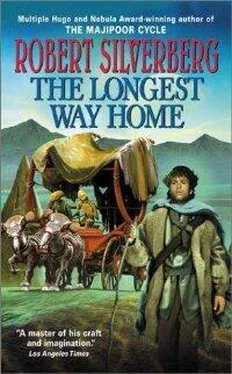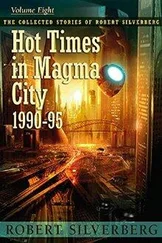He and Thiyu never spoke of anything but herbs and potions, and that only in the briefest possible terms. There was no conversation between them. Nor was there with any of the others, not even Ulvas. The Ardardin was the only Indigene in the village with whom Joseph had anything like a friendship. After Joseph had done his day’s work in the infirmary the Ardardin often would accompany him back to his room, and gradually it fell into the habit of remaining for a while to talk with him.
The themes were wide-ranging, though always superficial. They would speak of Helikis, a place about which the Ardardin seemed to know almost nothing, or about the problems the Ardardin’s people had had this summer with their crops, or the work Joseph was doing in the infirmary, or the improving condition of his leg, or the weather, or the sighting of some rarely seen wild animal in the vicinity of the village, but never about anything that had to do with Indigene-human relationships, or the civil war now going on between Masters and Folk. The Ardardin set the pace, and Joseph very swiftly saw which kinds of topics were appropriate and which were out of bounds.
The Ardardin seemed to enjoy these talks, to get definite pleasure from them, as though it had long been starved for intelligent company in this village before Joseph’s arrival. Joseph was surprised to find that they were talking as equals, in a sense, sitting face to face and exchanging ideas and information on a one-to-one basis, although he was only a half-grown fugitive boy and the Ardardin was a person of stature and authority, the leader of the village. But maybe the Ardardin did not realize how young Joseph really was. Of course, Joseph was a Master, a person of rank among his own people, the heir to a great estate somewhere far away. But there was no reason why the Ardardin would be impressed by that. Was it that he was functioning as the tribal doctor? Maybe. More likely, though, the Ardardin was simply extending to him the courtesy that it felt one adult intelligent creature owed another. There was, at any rate, a certain sense of equality for Joseph in their talks. He found it flattering. No one had ever spoken to Joseph in that way before. He took it as a high compliment.
Then the nature of his conversations with the Ardardin began to change. It was an almost imperceptible transformation. Joseph could not say how the change began, nor why the talks now became fixed on a single daily subject, which was the religious beliefs of the Indigenes and the light that those beliefs cast on the ultimate destiny of all the creatures of Homeworld. The result was a distinct alteration of the parity of the meetings. Now, once more, Joseph was back in the familiar role of the student listening to the master. Though the Ardardin seemed to be treating him as a scholar seeking information, not as a novice stumbling about in the darkness of his own ignorance, Joseph had no illusions about the modification of their relationship.
Perhaps it was a reference that the Ardardin made one afternoon to “the visible sky” and “the real sky” that had started it.
“But the visible sky is the real sky,” said Joseph, mystified. “Is that not so?”
“Ah,” said the Ardardin. “The sky that we see is a trivial simple thing. What has true meaning is the sky beyond it, the sky of the gods, the celestial sky.”
Joseph had problems in following this. He was fluent enough in Indigene, but the abstract concepts that the Ardardin was dealing in now involved him in a lot of new terminology, ideas that he had never had to deal with before, and as the discussion unfolded he had to ask for frequent clarifications. Bit by bit he grasped the distinction that the Ardardin was making: the universe of visible phenomena on the one hand, and the much more significant universe of celestial forces, where the gods dwelled, on the other. It was the gods who dwelled in the real sky, the one that could not be seen by mortal eyes, but that generated the power by which the universe was held together.
That the Indigenes should have gods came as no surprise to Joseph. All peoples had gods of some sort. But he knew nothing whatever about theirs. No texts of Indigene mythology had ever come his way. In Keilloran there were Indigenes living all around; you constantly encountered them; and yet, Joseph saw now, they were so much taken for granted as part of the landscape that he had never paid any real attention to them, other than to learn the language, which was something that every Master was required to do. His father collected their artifacts, yes. But you could fill entire storehouses with pots and sculptures and weavings and still not know anything about a people’s soul. And though Balbus had said that Martin had studied Indigene philosophy as well, he had never shared a syllable of his findings with his son.
Joseph strained to penetrate the mysteries that the Ardardin was expounding now, wondering whether these were the things that his father supposedly had studied. Perhaps not. Perhaps they had never been shared with a person of human blood before.
The world that surrounds us, the Ardardin said, its mountains and seas and rivers and forests, its cities and fields, its every tangible aspect, is the terrestrial counterpart of the celestial world in the sky. That world is the world of the gods, the true world, of which the world of living beings was a mere pallid imitation. Everything we see about us, said the Ardardin, represents the crude attempts of mortal beings to replicate the gods’ own primordial act of creating their own world.
“Do you follow?” the Ardardin said.
“Not exactly,” said Joseph.
The Ardardin did not appear troubled by that. It went on speaking of things that were completely new to Joseph, the sacred mountain at the center of the world where the visible world and the invisible one come together, the axis upon which all things spin, the place where mundane time and mythical time meet, which is the navel of the world. The distinction between the time-scheme of living things and the time-scheme of the gods, worldly time and godly time, was obviously very important to the Indigenes. The Ardardin made it seem as though the world of ordinary phenomena was a mere film, an overlay, a stencil, a shallow and trivial thing although linked by the most powerful bonds to the divine world where fundamental reality dwelled.
All this was fascinating in its way, though Joseph’s mind did not ordinarily tend to go in these metaphysical directions. There was a certain strange beauty to it, the way a mathematical theorem has great beauty even if you could not see any way of putting it to practical use. After each conversation with the Ardardin he would dictate notes into his recorder, setting down all that he had been told while it was still fresh in his mind. By so doing he reinforced in his own mind the belief that he would somehow get out of Manza alive, that he would return to Helikis and share with others the remarkable fund of alien knowledge that he had brought back with him.
Even the most abstruse mathematical theorem, Joseph knew, represents one valid way of describing the universe, at least to those capable of comprehending it. But Joseph could not help looking upon what the Ardardin was telling him as a mere collection of fables, quaint primitive myths. One could admire them but on a fundamental level one could not believe them, certainly not in the way one believes that seven and six are thirteen, or that the square on the hypotenuse equals the sum of the squares on the other two sides. Those things were inherently, incontrovertibly true. The tales the Ardardin told were metaphors, ingenious inventions. They described nothing real. That did not make them any the less interesting, Joseph felt. But they had no relevance to him, so far as he could see, other than as curiosities of an alien civilization.
Читать дальше












